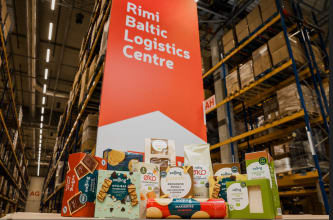
The European Union’s Plastics Directive prohibits the placing on the market of single-use plastic products from July 3rd, 2021. In 2018, Rimi’s parent company ICA Gruppen adopted a plastics strategy, where one of the goals was to eliminate disposable plastic products from sales throughout the Group by the end of 2020. Today, all Rimi stores in Estonia / Latvia / Lithuania sell disposable coffee cups, plates, cutlery, straws and cotton bud sticks made from paper, which does not end up as polluting plastic in the ocean. By implementing Rimi’s plastics strategy, we are one step ahead of the European Union’s plastics directive.
It is important to remember that the most sustainable choice is still always reusing and if possible, even not to use single use products. Some alternative products made from paper though are still covered with plastic layer (e.g. cups) to ensure durability and it’s necessary to sort them as waste. Most of the products forbidden from 3rd of July have been sold out in Rimi and there are more environmentally friendly alternatives instead. Looking for more sustainable and plastic free alternatives is Rimi daily and priority job, but it’s also important to keep in mind that they have to be easy to use and acceptable for customers.
As company we have also other initatives and aims in the plastic reduction area. In 2020 Rimi introduced an updated range of shopping bags, including a reusable bag made of 100% recycled plastic. In 2021, changes will be made in the plastic packaging of Rimi products, e.g. thinner jars for salads or smaller bags for fresh fish will be used. This will reduce about 35 tons of plastic per year. We see, that even the smallest changes bring huge results, for example: the transition to a 100% paper bakery bag will save up to 70 tons of plastic per year in all three Baltic countries
One of Rimi’s ambitions is to make the packaging of Private Label products recyclable or reusable by the end of 2022. We aim that in 2030 they will be made of materials that have already been recycled or reused. So we are working to find new packaging solutions that contribute to the reduction of plastics and the recycling and reuse of renewable materials.



